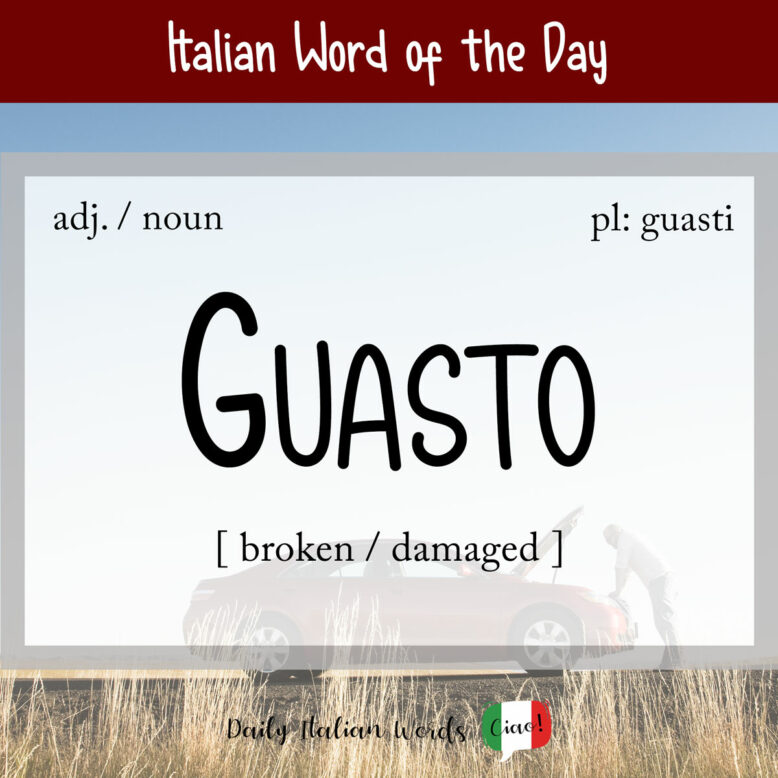My son is currently obsessed with trucks of all sorts, so it shouldn’t come as a surprise that one of his favourite words in Italian is guasto. It is used when something, such as a machine or vehicle, stops working as it should.
guasto
broken / faulty

Guasto is the past participle of the verb guastare, meaning to break or to spoil.
When guasto is used as an adjective, it can be translated in numerous ways including broken, out of order, damaged, broken down or faulty. The masculine, feminine and plural forms are as follow:
- guasto (masculine, singular)
- guasti (masculine, plural)
- guasta (feminine, singular)
- guaste (feminine, plural)
L’ascensore è di nuovo guasto!
The elevator is broken again!
Il carro attrezzi traina la macchina guasta.
The tow truck tows the broken-down car.
Interestingly, guasto can also be used to describe rotten or spoiled food, essentially serving as a synonym for marcio, or a part of the body that is working poorly or in a state of decay such as rotten teeth (denti guasti).
Non mangiare queste mele – sono guaste.
Don’t eat these apples – they’re rotten.
In a figurative sense, guasto can also mean corrupt, tainted or depraved.

Now let’s take a look at guasto used as a noun. In this case, it can mean damage, breakdown, fault, or failure depending on what is broken. For example:
- guasto all’impianto elettrico = damage to the electrical system
- guasto al motore = engine failure / fault in the engine
It is a masculine noun and the plural is guasti.
The expression avere un guasto means to break down when talking about vehicles, or to have a fault when talking about any other kind of mechanical instrument.
Hanno avuto un guasto alla macchina mentre viaggiavano sull’autostrada.
Their car broke down while they were travelling on the highway.
Guasto also has a figurative meaning of corruption when used as a noun.
Next, we come to a couple of idiomatic expressions featuring sangue (blood) and guasto. The first is farsi il sangue guasto (literally “to make oneself’s blood spoiled”) and it means “to get upset or angry about a difficult situation.” The second, avere il sangue guasto con qualcuno (literally “to have rotten blood with someone”), is used when you have it in for someone, or bear a strong grudge against them.
Finally, you will often hear the word used in the third person form of the verb guastare together with the adverb non to say that something won’t do any harm or will be useful such as, for example, un po’ di sale non guasta mai (a bit of salt won’t do any harm). There is also the expression below:
Un po’ di fortuna non guasta mai!
A bit of luck wouldn’t hurt.
Heather Broster is a graduate with honours in linguistics from the University of Western Ontario. She is an aspiring polyglot, proficient in English and Italian, as well as Japanese, Welsh, and French to varying degrees of fluency. Originally from Toronto, Heather has resided in various countries, notably Italy for a period of six years. Her primary focus lies in the fields of language acquisition, education, and bilingual instruction.


